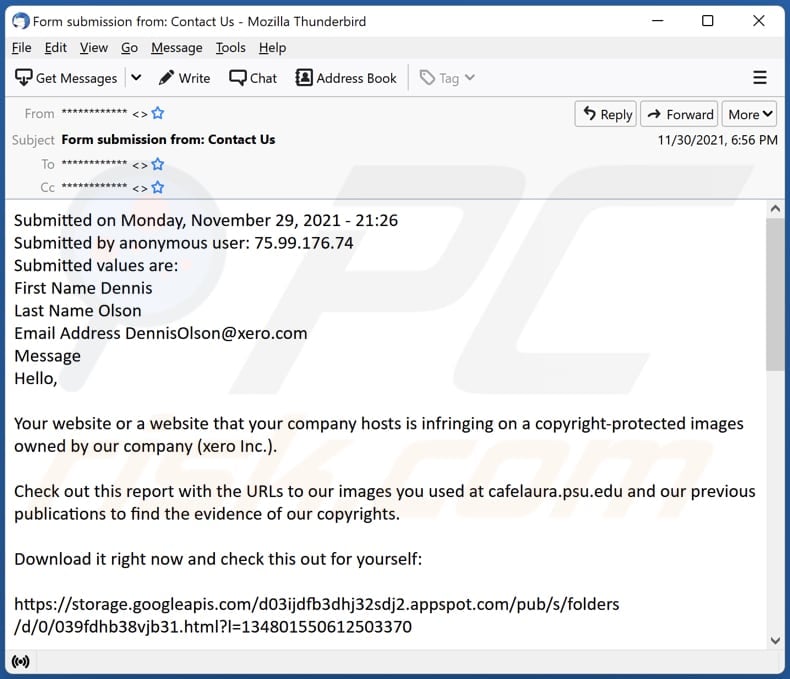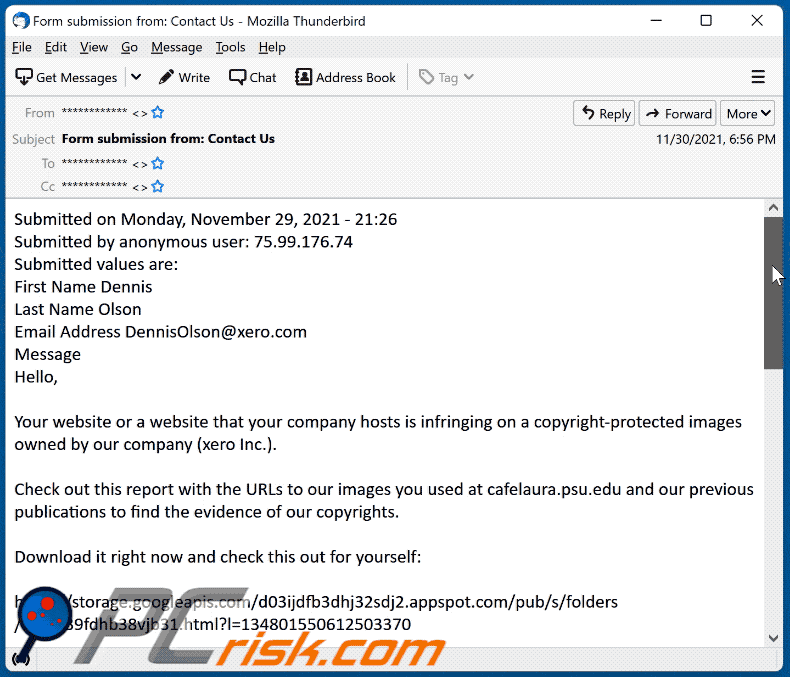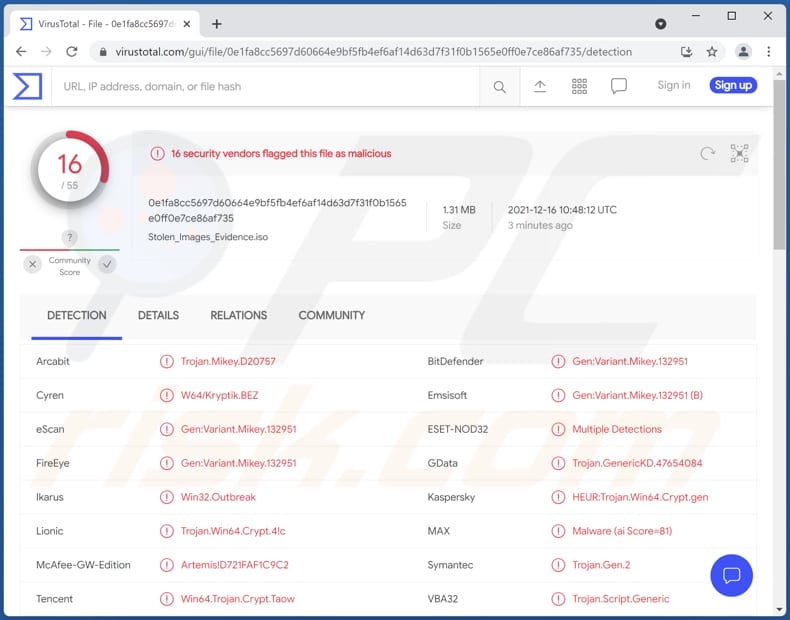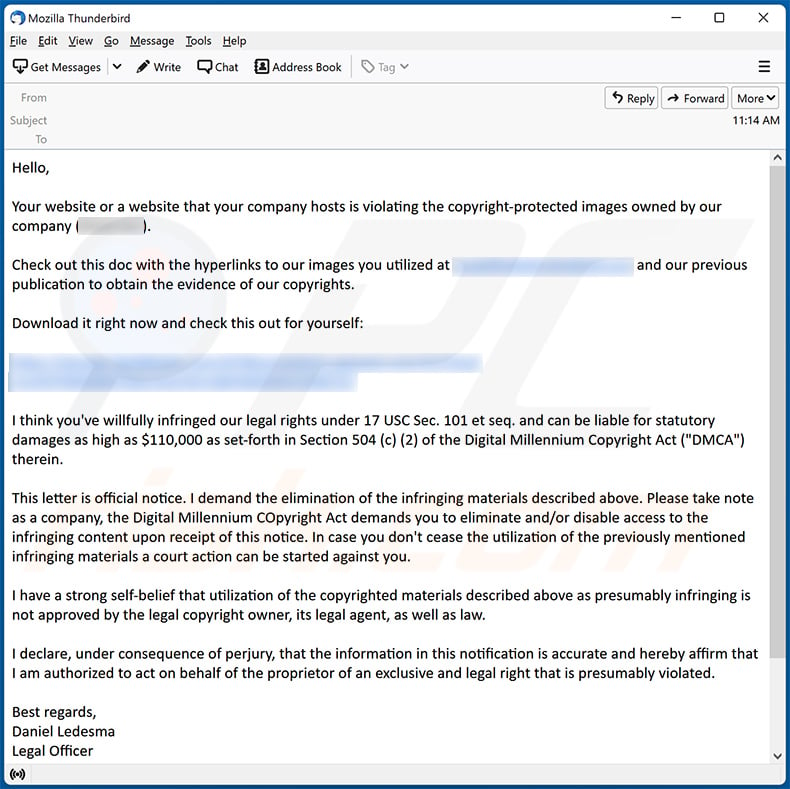How to recognize malspam like DMCA Copyright Infringement Notification?
Phishing/ScamAlso Known As: DMCA Copyright Infringement Notification spam
Get free scan and check if your device is infected.
Remove it nowTo use full-featured product, you have to purchase a license for Combo Cleaner. Seven days free trial available. Combo Cleaner is owned and operated by RCS LT, the parent company of PCRisk.com.
What is DMCA Copyright Infringement Notification email virus?
It is a malspam campaign used to deliver IcedID. Cybercriminals behind it attempt to trick recipients into believing that they have received an email regarding a violation of the Digital Millennium Copyright Act (DMCA). Their goal is to trick recipients into executing a malicious file downloaded via the provided googleapis URL.

DMCA Copyright Infringement Notification email virus in detail
Cybercriminals behind this email attempt to trick recipients that their website or a website hosted by their company is infringing copyright. They claim that some copyright-protected images owned by another company are stored on a website without permission. Cybercriminals aim to trick recipients into checking those images on the provided page.
That website abuses Google services to distribute malware. It is used to distribute a malicious ISO file containing a shortcut file named "Stolen_Images_Evidence". This shortcut is designed to execute hidden files that infect computers with IcedID.
What is IcedID?
IcedID is a high-risk Trojan that monitors browsing activity, steals personal information, and manipulates the infected system. It can download and execute files, upload desktop files, write registry keys, collect credentials stored in certain applications, and perform other actions. More information about this malware is provided here.
| Name | DMCA Copyright Infringement Notification spam |
| Threat Type | Trojan, password-stealing virus, banking malware, spyware. |
| Hoax | Email contains information regarding DMCA copyright infringement |
| File designed to distribute malware | Malicious ISO file |
| Detection Names (Stolen_Images_Evidence.iso) | Combo Cleaner (Gen:Variant.Mikey.132951), ESET-NOD32 (Multiple Detections), Kaspersky (HEUR:Trojan.Win64.Crypt.gen), Symantec (Trojan.Gen.2), Full List Of Detections (VirusTotal) |
| Symptoms | Trojans are designed to stealthily infiltrate the victim's computer and remain silent, and thus no particular symptoms are clearly visible on an infected machine. |
| Payload | IcedID |
| Distribution methods | Infected email attachments, malicious online advertisements, social engineering, software 'cracks'. |
| Damage | Stolen passwords and banking information, identity theft, the victim's computer added to a botnet. |
| Malware Removal (Windows) |
To eliminate possible malware infections, scan your computer with legitimate antivirus software. Our security researchers recommend using Combo Cleaner. Download Combo CleanerTo use full-featured product, you have to purchase a license for Combo Cleaner. 7 days free trial available. Combo Cleaner is owned and operated by RCS LT, the parent company of PCRisk.com. |
Malspam campaigns in general
Usually, emails used to distribute malware are disguised as letters regarding important documents or other matters. Cybercriminals behind them pretend to be legitimate companies or other entities. More examples of malspam campaigns are "Outer Banks Email Virus", "TurboTax Email Virus", and "Cosco Shipping Bank Email Virus".
How did my computer got infected with IcedID?
This particular email contains a googleapis URL. It opens a website asking for permission to download a malicious ISO file containing a shortcut and a couple of hidden DLL and JavaScript files. If opened, that shortcut runs both hidden files and infects a computer with IcedID.
Emails used to deliver malware also can contain malicious attachments. For example, malicious MS Office or PDF documents, archive files, JavaScript files, executable files.
How to avoid installation of malware?
Use official pages and direct links to download files, programs. Avoid using other sources. Do not open files or links in emails sent from suspicious, unknown addresses. Especially when such emails are completely irrelevant. Update and activate installed programs properly. It has to be achieved using tools, functions provided by their official developers.
If you've already opened file distributed via DMCA Copyright Infringement Notification email, we recommend running a scan with Combo Cleaner Antivirus for Windows to automatically eliminate infiltrated malware.
Appearance of the DMCA Copyright Infringement Notification email letter (GIF):

Text in this email:
Subject: Form submission from: - Contact Us
Your website or a website that your company hosts is infringing on a copyright-protected images owned by our company (xero Inc.).
Check out this report with the URLs to our images you used at cafelaura.psu.edu and our previous publications to find the evidence of our copyrights.
Download it right now and check this out for yourself:
-
I believe you've deliberately infringed our rights under 17 USC Sec. 101 et seq. and can be liable for statutory damage as high as $140,000 as set forth in Sec. 504 (c)(2) of the Digital Millennium Copyright Act (”DMCA”) therein.
This message is official notification. I seek the removal of the infringing materials referenced above. Take note as a service provider, the DMCA requires you to eliminate and/or disable access to the infringing content upon receipt of this particular notification letter. In case you do not cease the use of the previously mentioned infringing materials a law suit will likely be initiated against you.
I have a strong belief that utilization of the copyrighted materials referenced above as presumably violating is not approved by the legal copyright owner, its agent, as well as legislation.
I declare, under penalty of perjury, that the information in this letter is accurate and hereby affirm that I am authorized to act on behalf of the proprietor of an exclusive and legal right that is presumably violated.
Detections for the malicious ISO file used to distribute malware:

Another example of an email from "DMCA Copyright Infringement Notification" spam campaign:

Text presented within:
Hello,
Your website or a website that your company hosts is violating the copyright-protected images owned by our company (- Inc.).
Check out this doc with the hyperlinks to our images you utilized at - and our previous publication to obtain the evidence of our copyrights.
Download it right now and check this out for yourself:
-
I think you've willfully infringed our legal rights under 17 USC Sec. 101 et seq. and can be liable for statutory damages as high as $110,000 as set-forth in Section 504 (c) (2) of the Digital Millennium Copyright Act ("DMCA") therein.
This letter is official notice. I demand the elimination of the infringing materials described above. Please take note as a company, the Digital Millennium COpyright Act demands you to eliminate and/or disable access to the infringing content upon receipt of this notice. In case you don't cease the utilization of the previously mentioned infringing materials a court action can be started against you.
I have a strong self-belief that utilization of the copyrighted materials described above as presumably infringing is not approved by the legal copyright owner, its legal agent, as well as law.
I declare, under consequence of perjury, that the information in this notification is accurate and hereby affirm that I am authorized to act on behalf of the proprietor of an exclusive and legal right that is presumably violated.
Best regards,
Daniel Ledesma
Legal Officer
-, Inc.
Instant automatic malware removal:
Manual threat removal might be a lengthy and complicated process that requires advanced IT skills. Combo Cleaner is a professional automatic malware removal tool that is recommended to get rid of malware. Download it by clicking the button below:
DOWNLOAD Combo CleanerBy downloading any software listed on this website you agree to our Privacy Policy and Terms of Use. To use full-featured product, you have to purchase a license for Combo Cleaner. 7 days free trial available. Combo Cleaner is owned and operated by RCS LT, the parent company of PCRisk.com.
Quick menu:
- What is DMCA Copyright Infringement Notification spam?
- Types of malicious emails.
- How to spot a malicious email?
- What to do if you fell for an email scam?
Types of malicious emails:
![]() Phishing Emails
Phishing Emails
Most commonly, cybercriminals use deceptive emails to trick Internet users into giving away their sensitive private information, for example, login information for various online services, email accounts, or online banking information.
Such attacks are called phishing. In a phishing attack, cybercriminals usually send an email message with some popular service logo (for example, Microsoft, DHL, Amazon, Netflix), create urgency (wrong shipping address, expired password, etc.), and place a link which they hope their potential victims will click on.
After clicking the link presented in such email message, victims are redirected to a fake website that looks identical or extremely similar to the original one. Victims are then asked to enter their password, credit card details, or some other information that gets stolen by cybercriminals.
![]() Emails with Malicious Attachments
Emails with Malicious Attachments
Another popular attack vector is email spam with malicious attachments that infect users' computers with malware. Malicious attachments usually carry trojans that are capable of stealing passwords, banking information, and other sensitive information.
In such attacks, cybercriminals' main goal is to trick their potential victims into opening an infected email attachment. To achieve this goal, email messages usually talk about recently received invoices, faxes, or voice messages.
If a potential victim falls for the lure and opens the attachment, their computers get infected, and cybercriminals can collect a lot of sensitive information.
While it's a more complicated method to steal personal information (spam filters and antivirus programs usually detect such attempts), if successful, cybercriminals can get a much wider array of data and can collect information for a long period of time.
![]() Sextortion Emails
Sextortion Emails
This is a type of phishing. In this case, users receive an email claiming that a cybercriminal could access the webcam of the potential victim and has a video recording of one's masturbation.
To get rid of the video, victims are asked to pay a ransom (usually using Bitcoin or another cryptocurrency). Nevertheless, all of these claims are false - users who receive such emails should ignore and delete them.
How to spot a malicious email?
While cyber criminals try to make their lure emails look trustworthy, here are some things that you should look for when trying to spot a phishing email:
- Check the sender's ("from") email address: Hover your mouse over the "from" address and check if it's legitimate. For example, if you received an email from Microsoft, be sure to check if the email address is @microsoft.com and not something suspicious like @m1crosoft.com, @microsfot.com, @account-security-noreply.com, etc.
- Check for generic greetings: If the greeting in the email is "Dear user", "Dear @youremail.com", "Dear valued customer", this should raise suspiciousness. Most commonly, companies call you by your name. Lack of this information could signal a phishing attempt.
- Check the links in the email: Hover your mouse over the link presented in the email, if the link that appears seems suspicious, don't click it. For example, if you received an email from Microsoft and the link in the email shows that it will go to firebasestorage.googleapis.com/v0... you shouldn't trust it. It's best not to click any links in the emails but to visit the company website that sent you the email in the first place.
- Don't blindly trust email attachments: Most commonly, legitimate companies will ask you to log in to their website and to view any documents there; if you received an email with an attachment, it's a good idea to scan it with an antivirus application. Infected email attachments are a common attack vector used by cybercriminals.
To minimise the risk of opening phishing and malicious emails we recommend using Combo Cleaner Antivirus for Windows.
Example of a spam email:

What to do if you fell for an email scam?
- If you clicked on a link in a phishing email and entered your password - be sure to change your password as soon as possible. Usually, cybercriminals collect stolen credentials and then sell them to other groups that use them for malicious purposes. If you change your password in a timely manner, there's a chance that criminals won't have enough time to do any damage.
- If you entered your credit card information - contact your bank as soon as possible and explain the situation. There's a good chance that you will need to cancel your compromised credit card and get a new one.
- If you see any signs of identity theft - you should immediately contact the Federal Trade Commission. This institution will collect information about your situation and create a personal recovery plan.
- If you opened a malicious attachment - your computer is probably infected, you should scan it with a reputable antivirus application. For this purpose, we recommend using Combo Cleaner Antivirus for Windows.
- Help other Internet users - report phishing emails to Anti-Phishing Working Group, FBI’s Internet Crime Complaint Center, National Fraud Information Center and U.S. Department of Justice.
Frequently Asked Questions (FAQ)
Why did I receive this email?
Cybercriminals behind such emails usually do not target anyone in particular. They send the same email to all addresses in their database.
I have opened a file downloaded via the provided website, is my computer infected?
No, opening that ISO file is not enough for IcedID to be executed. This malware infects computers after opening a shortcut in the ISO file.
I have read the email but didn't open the website, is my computer infected?
No, opening an email by itself is completely harmless. Clicking links within the email or opening attachments is what leads to computer infections.
Will Combo Cleaner remove malware infections that were present in email attachment?
Yes, Combo Cleaner can detect and eliminate almost all known malware. It is important to scan the operating system using a full scan. Otherwise, antivirus software might not detect malware that is hidden deep in the system.
Share:

Tomas Meskauskas
Expert security researcher, professional malware analyst
I am passionate about computer security and technology. I have an experience of over 10 years working in various companies related to computer technical issue solving and Internet security. I have been working as an author and editor for pcrisk.com since 2010. Follow me on Twitter and LinkedIn to stay informed about the latest online security threats.
PCrisk security portal is brought by a company RCS LT.
Joined forces of security researchers help educate computer users about the latest online security threats. More information about the company RCS LT.
Our malware removal guides are free. However, if you want to support us you can send us a donation.
DonatePCrisk security portal is brought by a company RCS LT.
Joined forces of security researchers help educate computer users about the latest online security threats. More information about the company RCS LT.
Our malware removal guides are free. However, if you want to support us you can send us a donation.
Donate
▼ Show Discussion